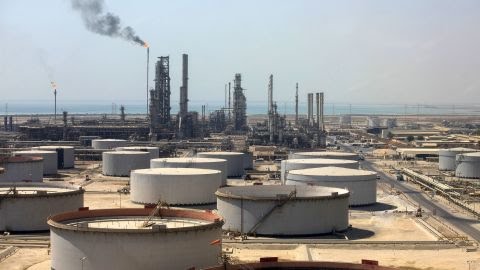
Oil tanks
Demand Fears, Supply Cuts Keep Global Oil Markets On Edge
Saudi Arabia’s extension of production cuts should, under normal circumstances, be a major upside for oil prices, triggering an immediate run in Brent or WTI. None of that happened this week when Riyadh announced its decision, however, with Brent finishing Monday lower than its starting point. With the eurozone’s PMI index falling to 43.4, its lowest since early Covid days, Japan plunging into contraction again and South Korea recording its twelfth consecutive manufacturing contraction, macroeconomic fears got the upper hand, again.
Saudi Arabia announced it would extend its 1 million b/d unilateral production cut for July into August, saying it is doing so „with the aim of supporting the stability and balance of oil markets”.
Merely a couple of minutes after Saudi Arabia’s extension of its production cut, Russia’s deputy prime minister Alexander Novak pledged to cut oil exports by 500,000 b/d in August, without providing a baseline from which it would be cut.
European Union members once again failed to reach an agreement on the bloc’s electricity reform, arguing over the extent of state aid for new power plants, with Germany and its allies aiming to limit France’s help to its future nuclear plants.
Hedge funds and other market speculators have sold the equivalent of 64 million barrels in WTI and ICE Brent futures and options contracts, with net positioning in crude oil falling to its lowest level since CFTC started to track this data back in 2013.
Thomas Brostrom, the head of Shell’s (LON:SHEL) renewable branch, is leaving the company after a less than 2-year stint as the company scaled back its energy transition plans to reap the rewards of high fossil fuel prices.
Chinese state-owned oil major Sinopec (SHA:600028) launched its first-ever green hydrogen plant in the western region of Xinjiang, aiming to produce 20,000 metric tonnes per year using solar power and to supply it to the Tahe refinery.
After Macquarie Commodities landed half of the 3-million-barrel September SPR purchase deal, the US Department of Energy hinted at further buying in October-November sayng they maintain a 13-million-barrel SPR refill target.
Rising for the 10th consecutive month, India’s imports of Russian crude oil hit an all-time high of 2.2 million b/d in June according to Kpler data, more than the country’s traditional suppliers Iraq and Saudi Arabia combined.
Chinese iron ore futures have slipped to $106-107 per metric tonne after the city authorities of Tangshan, a key steelmaking hub in the country, ordered steel mills to cut production to improve air quality amidst heavy („orange”) pollution alerts.
China’s domestic coal suppliers are lobbying the government to slow down coal imports, up 90% year-on-year as some 182 million tonnes were imported in January-May 2023, arguing their profits have fallen 20% since the beginning of the year.
Mexico’s 340,000 b/d Olmeca refinery, built in the hometown of President Manuel Lopez Obrador in Dos Bocas, began loading crude for oil processing this week, however industry sources only expect it to begin commercial operations in early 2024.
The UN’s International Seabed Authority (ISA) is poised to receive applications from private companies on floor exploration and mining activities in international waters after the two-year application period stipulated for governments ends on July 9.
The US Fish and Wildlife Service announced it intends to protect the dunes sagebrush lizard under the Endangered Species Act, jeopardizing the operations of more than a dozen frac sand mines across Texas and southeastern New Mexico.
